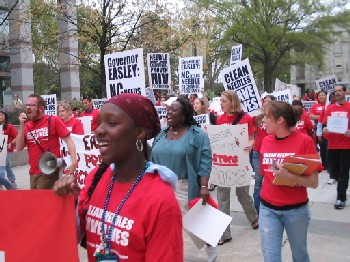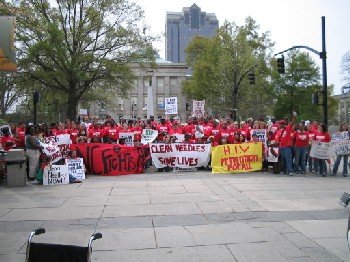Feature:
Marchers
Take
to
the
Streets
to
Demand
Legal
Needle
Exchanges
in
North
Carolina
4/14/06
Bills that would allow for legal needle exchange programs (NEPs) in North Carolina have been languishing since 1997, but this year, the push is on to get one through the legislature. Last Friday, in the most visible manifestation yet of that intensified effort, around 150 people marched on the governor's mansion to demand he make it a priority in this year's short legislative session.
"Rep. Wright introduces this bill every year, and it goes nowhere because it's a political hot potato, but now is the time to get it passed," said Thelma Wright of the NC Harm Reduction Coalition. "This is not about helping people take drugs, this is about helping them stay healthy until they can quit taking drugs. That's what needle exchanges and harm reduction are all about," she told DRCNet. And that's why people marched, she said. "It was us and the Student Global Aids Campaign. It was supposed to be young people, but it turned into everybody's march. A lot of young people came out and let the governor and the legislature know how they feel about these issues, and I am really heartened by the turnout. I never dreamed we would have this many people." Even if the bill passes, there are still obstacles to overcome. The bill requires that a county's board of commissioners, the local board of health, health director and director of mental health or substance abuse services all sign a letter of support to the state health director in order to get a pilot program approved. So far, Guilford County is the only county to have the needed support for a pilot needle exchange -- and that's no coincidence. Guilford County is the home of one of the state's two unsanctioned NEPs, which Wright operated between 1999 and 2004 before turning it over to her successors. "It was underground but no secret," she said. "We never had a problem with the police, and the county sheriff said that while he would arrest us if he had to, he supported the program. And he never arrested us. I've been talking to the county health board about this issue since 1997, and they know the score, too," she said.
According to the North Carolina Department of Health and Human Services, HIV infections caused by injection drug use make up only about 6% of all new infections, but with some 18,000 HIV and AIDS cases in the state, that means about 100 cases could have been prevented by using clean needles. The number of infections caused by shooting up with dirty needles could be much higher; in nearly one-third of cases reported in the state, the means of infection is listed as unknown. The department supports the NEP bill. "There is strong evidence nationally that needle exchange programs reduce the spread of HIV and in no way increase drug use," said Evelyn Foust, the department's state AIDS director. "In order to treat addiction, you have to meet people where they're at," she told DRCNet. "People are getting infected; we don't have any time to lose." "Department of Health and Human Services Director Carmen Hooker Odom supports needle exchange, too," said Wright. "We have a letter from her saying she does. I'll be waving that around the legislature." But Gov. Mike Easley (R) does not support it, and his support is critical to getting the bill included in this year's short session on the budget. While he is recommending increased funding for "comprehensive" HIV prevention, his budget request does not include needle exchange programs. His office did not want to talk about his position, instead referring DRCNet to Health and Human Services. "The governor doesn't want this -- no needle exchange or harm reduction," said Wright. "That's why we marched to his mansion. We wanted to let him know loud and clear that you're not doing prevention unless you're doing it for everybody. Needle exchange is prevention and prevention is needle exchange," she said. Support for the bill is building, with groups like the Women's Health Organization and the Minority AIDS Council putting it on their legislative agendas. But right now, the bill is parked in the House Appropriations Committee. Still, Wright was confident this will be the year. "I certainly do think we can get this through, and it's about time. We need to help stop people from getting sick."
|


